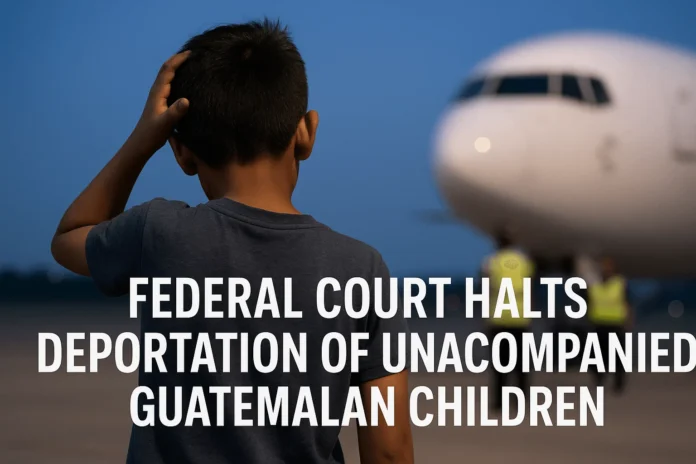In a major legal development, a U.S. federal judge has temporarily blocked the deportation of unaccompanied Guatemalan children, stopping the Trump administration’s plan to return dozens of minors to their home country. The ruling came after an emergency legal challenge from immigrant advocacy groups, protecting hundreds of vulnerable children currently in government custody.
Why the Deportation of Unaccompanied Guatemalan Children Was Blocked
Early on Sunday, immigrant rights organizations filed an emergency injunction to prevent the removal of at least 10 minors aged between 10 and 17. These children had crossed the U.S. border alone and were under the care of federal authorities while their immigration claims were being reviewed.
Advocates argued that the government’s sudden attempt to deport these children violated federal laws designed to protect unaccompanied minors. U.S. legislation provides such children the right to due process, legal representation, and asylum assessments before any deportation can occur.
Judge’s Emergency Order and Its Immediate Impact
During a hastily arranged Sunday hearing, U.S. District Judge Sparkle L. Sooknanan issued a 14-day temporary restraining order preventing the government from deporting the minors.
The judge demanded confirmation from federal officials that no child had been flown out of the U.S. Government lawyers assured the court that all flights had been stopped and the children remained under the care of the Office of Refugee Resettlement (ORR).
In a significant move, the judge extended the order beyond the original group of 10 minors, protecting all unaccompanied Guatemalan children in federal shelters unless they already had finalized removal orders.
Conflicting Positions on the Children’s Future
Advocacy Groups’ Concerns
Immigrant advocacy organizations stressed that returning the children to Guatemala without proper legal review could put them at serious risk. Many minors, they argued, fled violence, abuse, and persecution in their home country, and sending them back without due process would violate U.S. and international child protection laws.
Government’s Argument
The Trump administration claimed that these were not deportations but voluntary repatriations, coordinated with the Guatemalan government and the children’s relatives. Officials stated that the goal was to reunite minors with their families in Guatemala.
However, advocates disputed this claim, pointing out that many families had not requested reunification and that some children faced grave dangers if returned prematurely.
Emotional Impact on Families
The uncertainty has deeply affected families waiting in Guatemala. Many parents had gathered at reception centers in anticipation of their children’s arrival, only to learn that the flights had been grounded.
One mother expressed her confusion and fear after receiving a call from her 17-year-old son saying he was being sent back, only to find out later that his flight had been stopped. Another relative shared that his nephew had left Guatemala seeking better opportunities and medical care, highlighting the desperation that drives many families to send children north.
Statements from Advocacy Leaders
Efrén C. Olivares from the National Immigration Law Center welcomed the ruling, saying:
“In the dead of night on a holiday weekend, the administration tried to send frightened, vulnerable children back into danger. This court decision ensures their safety — at least for now.”
On the other hand, senior administration officials criticized the ruling, arguing that it blocked reunification and delayed family connections.
What Happens Next
- The temporary restraining order will remain in force for a period of 14 days.
- The court will hold further hearings to determine whether the order should be extended or made permanent.
- The ruling sets the stage for a larger legal battle over the balance between immigration enforcement and child protection laws.
Conclusion
The federal court’s intervention highlights the ongoing clash between immigration enforcement and humanitarian protections. Advocates insist on protecting children’s rights and guaranteeing due process, even as the Trump administration presents its activities as family reunification.
For now, the deportation of unaccompanied Guatemalan children has been halted — but the upcoming hearings will determine their ultimate fate.


